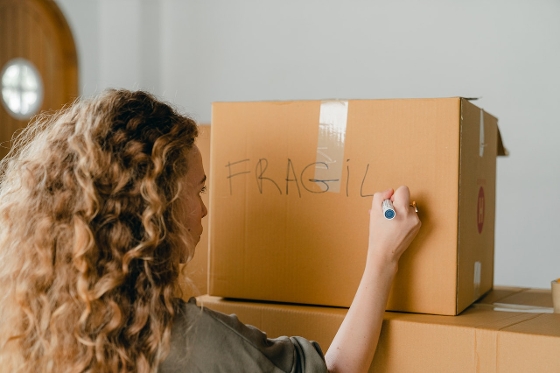You cleaned, reorganized, and staged your home in preparation for the iconic red, white and blue sign to be planted firmly on your front lawn. In the time it took to sell your house, you found your dream home. The “i’s” are dotted, the “t’s” crossed, and the moving day countdown starts!
In an ideal world, 6-8 weeks of notice is the perfect timeframe to plan an efficient move. Whether you’re a first-time home buyer, upgrading to accommodate your growing family, or even downsizing; moving can be a time-consuming process with surprises if you don’t plan properly.
Having more notice and a large window of time allows you to find credible movers, sort through your belongings, and enjoy the last days of your current home.
The realtors at our office put together an in-depth moving checklist based on an 8-week timeline, but you can easily condense our list to a few short weeks! We’ll even provide helpful tips for those with a stricter timeline.
8 Weeks Before Moving:
1. Create a Moving Binder or FolderCoordinating schedules, booking appointments, tracking receipts, etc., can all become overwhelming and confusing while you’re in the middle of a move.
If you’re old school and love paper copies, run to the nearest dollar store and grab a binder. You’ll want to include a calendar for the next two months, a running budget, and an extra writing pad. Also, make sure the binder has folders to store your receipts. Of course, Google Docs or another online program can track this information.
The gist, you want a centralized place for your moving plans, so you can effortlessly reflect on your schedule and know where you’re at in your budget.
* Helpful tip from a realtor:
Include the measurements of your new home in your moving planner. Having the dimensions is helpful for furniture shopping, grabbing quotes from movers, arranging carpet cleaning, etc.
After purchasing a home, the last thing homeowners want is additional debt, and moving expenses add up quickly. A relocation budget will keep you in line and reduce your chance of making on-the-go purchases.
In Winnipeg, moving companies charge from $40-$80 per hour per mover, plus gas and mileage. A one-bedroom apartment usually needs two movers for 2-4 hours (loading and unloading). A four-bedroom house would probably need 3-4 movers and could take up to 8 hours. It’s essential to call multiple companies to find the most affordable option.
Other expenses you should consider are
- Supplies like boxes, containers, tape, bubble wrap, etc.
- Food and drinks if friends/family are helping you move, or a tip for the professional movers.
- Packing and unpacking or storage services if needed.
Remember that a moving company will provide an estimated quote; that price can increase if the move takes longer, if there are extra stops, or if additional mileage/gas is needed because of traffic.
The moving company will be your most significant expense for relocating, but they are also your lifeline (so to speak). Would you rather pay an extra $200 for a reliable company or have the movers cancel last minute? The choice is easy.
When you’re calling moving companies, make sure you ask these top questions:
- Are you properly licensed and insured?
- What kind of liability coverage options do you offer?
- Can you provide a binding quote or a not-to-exceed estimate?
- Are the date and time for my appointment guaranteed?
Before committing to a company, read online reviews, ask your friends for referrals, and trust your gut. If possible, take time to make this decision because it will affect your relocation process substantially.
Although, moving companies fill up fast during the beginning and end of the month. Book weeks in advance if you’re relocating during that period.
Losing sight of important documents or sentimental photos will send anyone into a panic. Gather necessary paperwork and valuables in one location and store them in a secure, low-traffic place before you start packing or downsizing. Save your documents and photographs to the cloud or an external hard drive. This way, you will never lose sight or look for them frantically.
6 Weeks Before Moving:
5. Book a Moving CompanyDepending on the date, you might be able to book your appointment later, but early booking will secure you the most convenient time and date. Plus, if you need to adjust the date or time, you have a better chance of securing another appointment.
Top Rated Moving Companies in Winnipeg:
- Shortline Moving Solutions Inc – 4.7 Stars with 300+ Reviews
- Two Small Men with Big Hearts Moving Company – 4.6 Stars with 400+ Reviews
- Riverbend Moving and Storage - 4.2 Stars with 200+ Reviews
- Calculated Moving - 4.8 Stars with 100+ Reviews
Now that your move-in/out date is secure, book at least three days off work. Other services you should consider booking include storage, cleaning, and minor repairs.
We also recommend switching or updating your new address for the following: internet, cable, phone line, hydro, prescriptions, medical provider(s), insurance company, memberships, etc.
Start getting your supplies ready because packing is around the corner! Grab some sturdy boxes, containers, bubble wrap, tape, packing paper, markers, etc. Check your local grocery or furniture store for free boxes.
While you’re trying to plan for supplies–making a room-by-room inventory list isn’t a bad idea. It’ll be easier to gauge the number of boxes and what sizes make the most sense, categorize all breakables, plus you can take photos of valuable items.
It’s also a great opportunity to declutter and downsize your home: donate clothing, host a garage sale, or sell gently used items online. Keep a donation bin in each room so that when you pack, it’s easy to separate and remove items.
* Helpful tip from a realtor:
To determine what supplies and how much you’ll need, try out this Packing Calculator.
4 Weeks Before Moving:
8. Develop a Packing Process + Start PackingDon’t roll up your sleeves and jump into the packing process; develop a basic packing outline instead. Start by labeling boxes, choosing which rooms are inessential, and making a mental note of the most commonly used products. This way, you’re not packing and unpacking to find necessities. Plus, you have an idea of what to pack daily.
A room-by-room inventory list will streamline the process.
* Helpful tip from a realtor:
Pack your dish plates vertically, so they’re less likely to break and take photos of your electronics wiring for hassle-free setup.
As you’re packing, visualize your new space. A living room cabinet might work better in the basement. Your bedroom mirror might be more suitable for the guest room. Maybe you need to buy a mini fridge for the basement.
The first week after you move, you’ll be tired. You won’t want to search through every box or run around your new home looking for the proper decorations. It’s better to pack items by room in the beginning.
Contact the moving company and confirm the date and time of your appointment and remind them of any particulars like which elevator to use, where to park, etc.
Many skip this step, but human mistakes happen: finding out you’re booked for noon instead of 10 am is manageable four weeks in advance. Finding that out the day of will completely throw off your schedule.
Even though you’ve contacted your service providers and memberships to update your address, you might want to opt for mail forwarding through Canada Post (if you live in Winnipeg or Canada).
Currently, Canada Post offers contracts for 12, 4, or 3 months. They sell temporary forwarding if you’ll be renting in between your moves.
Having a sitter for children and pets is highly recommended. Holding a box in one hand and a child in another isn’t ideal. Running after loose cats isn’t much better.

The Last 2 Weeks Before Moving:
13. Address Change - Does Everyone Know?One last check that you’ve updated your address and notified everyone of your new home! Be sure to tell friends, family, and any close neighbors.
At this point, all nonessentials are packed, and essentials should be on the way.
- Use up the food in your fridge.
- Do your last loads of laundry and dishwashing.
- Plan your outfits and daily needs.
- Disassemble furniture.
- Make a 24-hour moving suitcase (include your wallet, a couple of comfy outfits, phone charger, personal items, snacks, cash, etc.)
Not hiring cleaners? It’s more efficient to clean empty rooms as you go. After packing your belongings, push the boxes to the middle of the room so you can start cleaning closets, windows, walls, etc. Before your final walk-through, all you have to do is sweep and mop.
Whether you’re buying or renting, you want proof of the condition you left your home in. Take photos of each room, the exterior, and the general property.
Most don’t have the time or energy to unpack their belongings in a single day. By developing an unpacking plan, you can take this process as slow or quickly as you need.
An unpacking plan is especially handy for couples, families or roommates. When someone stays home they can efficiently unpack and organize.
It’s Moving Day!
18. Wake Up EarlyIt is not the day to hit snooze. Walk through the house before anyone else arrives; ensure the boxes are organized, no items are left unpacked, and there are walking pathways.
* Helpful tip from a realtor:
Quickly drive to your new place and do a walk-through (if possible), so you can provide notes to the movers or clean up.
Double-check the mover’s paperwork to ensure they’re the right company and are legitimate. Go over the relocation plan so everyone is on the same page, and review the mover’s inventory sheet. Be available to answer questions or lend a helping hand.
If you want to go the extra mile, you can provide snacks or drinks, but it’s customary to tip movers 15%-20% for large moves or 5%-10% for smaller jobs. Provide a cash tip unless you’re claiming the expense. In that case, pay the total including the tip, with a credit card.
On your final walk-through, finish all of your cleanings and double-check the closets for missed personal belongings. Hand over all of the keys (house keys, mailbox keys, any room keys, and the garage door opener).
Finally, you’re done!
5 Tips for a Last-Minute Move
Whatever the reason is, quick moves happen – we still recommend following our ultimate moving checklist closely, but instead of doing it week by week, check the boxes off day by day.
We also have 5 top tips for last-minute moves:
-
You won’t have time to make an organized list of your service providers, memberships, personal contacts, etc., instead of making individual calls or emails, opt for Canada Post’s mail forwarding service.
-
Don’t waste time running around for supplies. Use what you have to the best of your abilities. Wrap glassware in clean socks, and breakables with blankets, use laundry baskets and storage bins for boxes and try to keep wires plugged into electronics.
-
Try to discard garbage or unnecessary items as you go, but don’t prioritize downsizing while you’re packing. Your focus can go to it while unpacking.
-
Ask for help. This is the time to call in your favours, browse Kijiji ads for affordable labour, and ask your moving company if they provide any additional services like packing.
-
Clean as you go. With a short turnaround, clean as you go and limit messes to your best effort. Carry a cloth and broom with you so you can dust and sweep immediately after packing.
Relocating to a New Home
As demanding as moving can be, deciding to relocate can be just as difficult. There are a lot of fundamentals to consider like timing, financials, neighbourhoods, and the actual reasoning for relocating.
Granted that you’re on the fence about buying a house in Winnipeg or continuing your rental journey, we highly recommend reading Should I Rent or Should I Buy? It’s a quick guide to helping you decide the right move.








